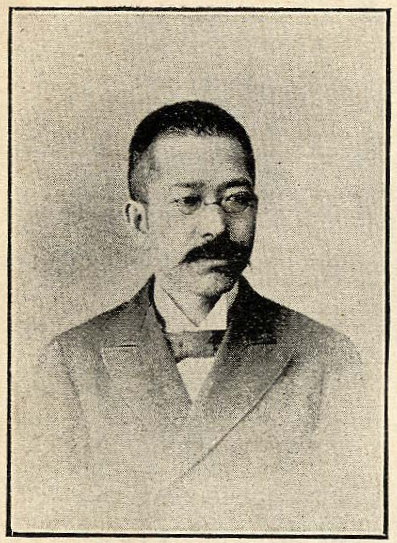Taguchi Ukichi on:
[Wikipedia]
[Google]
[Amazon]
 was a
was a
Taguchi, Ukichi
��
 was a
was a Japanese
Japanese may refer to:
* Something from or related to Japan, an island country in East Asia
* Japanese language, spoken mainly in Japan
* Japanese people, the ethnic group that identifies with Japan through ancestry or culture
** Japanese diaspor ...
historian and Georgist
Georgism, also called in modern times Geoism, and known historically as the single tax movement, is an economic ideology holding that, although people should own the value they produce themselves, the economic rent derived from land—including ...
economist of the Meiji period
The is an era of Japanese history that extended from October 23, 1868 to July 30, 1912.
The Meiji era was the first half of the Empire of Japan, when the Japanese people moved from being an isolated feudal society at risk of colonization ...
, and one of the foremost proponents of the '' bunmeishi'' view of history. He was elected to the House of Representatives of Japan
The is the lower house of the National Diet of Japan. The House of Councillors is the upper house.
The composition of the House is established by and of the Constitution of Japan. The House of Representatives has 465 members, elected for ...
in 1894. He is sometimes referred to as "the Japanese Adam Smith",De Bary, William Theodore, Carol Gluck
Carol Gluck (born November 12, 1941) is an American academic and Japanologist. She is the George Sansom Professor Emerita of History at Columbia University and served as the president of the Association for Asian Studies in 1996.
Career
Gluck wa ...
and Arthur E. Tiedemann eds. (2005). ''Sources of Japanese Tradition: Volume Two: 1600 to 2000''. Second Edition. New York: Columbia University Press. pp1227ff. as he wrote many journal articles advocating certain economic reforms and policies.
Biography
Perhaps Taguchi's most famous work is his ''Short History of Japanese Civilization'' (, ''Nippon kaika shōshi''). He put forth one of the first, and most famous, ''bunmeishi'' versions of Japanese history, focusing on the Japanese people and their culture, rather than on the governments, and on the role of the people in the country's overall progress over the ages. This approach differed from that of so-called '' kokushi'' historians of the time, who focused on the governments, and on a nationalistic version of history, emphasizing thenation-state
A nation state is a political unit where the state and nation are congruent. It is a more precise concept than "country", since a country does not need to have a predominant ethnic group.
A nation, in the sense of a common ethnicity, may in ...
. Taguchi's approach also differed drastically from that of earlier histories, which praised individual historical figures and elevated them as heroes. Taguchi denounced this practice, and many other elements of Confucian moralist history, seeking to describe history as accurately and objectively as possible, eliminating the literary or mythological aspects of heroes and villains.
Taguchi also wrote a number of other historical texts, published collections of classical documents in large-scale print runs, many of which survive today, and edited a historical journal called ''Shikai'' (, "Ocean of History"). This journal would ignite a controversy in 1892 which would cost major ''kokushi'' historian Kume Kunitake
was a historian in Meiji and Taishō period Japan. He had a son, Kume Keiichirō, who was a noted painter.
Biography
Kume was born in Saga Domain, Hizen (present-day Saga Prefecture), and was active in attempting to assist the administrat ...
his job.
Though his historical works were fairly thorough in their treatment of culture, technology, and other aspects of historical study, Taguchi's expertise was in economics. In addition to a number of texts on Japanese economic history, he founded an economics journal, Tokyo Economics Magazine (, ''Tōkyō keizai zasshi''), and proposed a number of plans for the reform and restructuring of Japan's economy in the wake of the Meiji Restoration
The , referred to at the time as the , and also known as the Meiji Renovation, Revolution, Regeneration, Reform, or Renewal, was a political event that restored practical imperial rule to Japan in 1868 under Emperor Meiji. Although there were r ...
.
In his work ‘Nihon jinshu ron’ (On the Japanese Race) from 1898 he proposed that the Japanese race was part of the Aryan race and was superior not only to the Chinese race but also superior to the other Aryan races. Yasuko Takezawa (2015) Translating and Transforming ‘Race’: Early Meiji Period Textbooks, Japanese Studies, 35:1, 5-21, DOI: 10.1080/10371397.2015.1041219
References
External links
Taguchi, Ukichi
��
National Diet Library
The is the national library of Japan and among the largest libraries in the world. It was established in 1948 for the purpose of assisting members of the in researching matters of public policy. The library is similar in purpose and scope t ...
)
{{DEFAULTSORT:Taguchi, Ukichi
1855 births
1905 deaths
Georgist economists
19th-century Japanese historians
Japanese economists
Writers from Tokyo